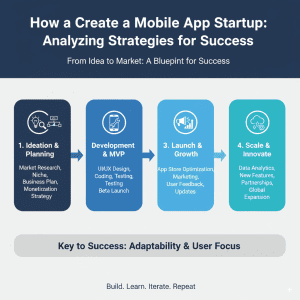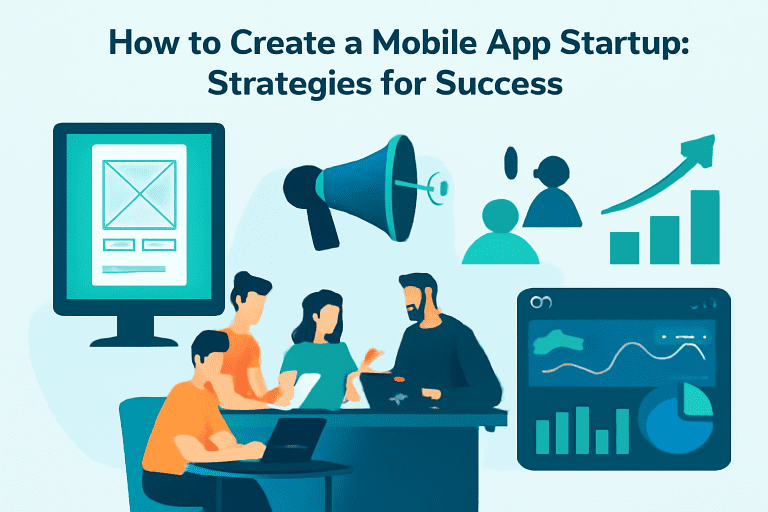Introduction
The mobile app industry continues to grow exponentially, offering unprecedented opportunities for entrepreneurs to launch startups that disrupt traditional markets and create new value. However, building a successful mobile app startup requires more than a great idea—it demands strategic planning, deep market understanding, agile development, and effective user acquisition tactics.

This blog explores critical strategies for launching a profitable mobile app startup, drawing from industry best practices, real-world examples, and technology trends. For comprehensive guidance on app development technologies and market adoption, discover TechOTD’s AI-driven mobile solutions and browse their latest tech blog.
Key Strategies for Creating a Successful Mobile App Startup
1. Conduct Thorough Market Research
-
Identify target customer segments, pain points, and gaps in existing app offerings.
-
Analyze competitors to differentiate your solution with unique value propositions.
-
Validate your app idea using surveys, focus groups, or MVP testing.
2. Define a Clear Business Model
-
Decide on revenue streams such as subscriptions, in-app purchases, advertising, or freemium features.
-
Ensure your value delivery aligns with profitable monetization methods.
3. Focus on User Experience (UX) and Design
-
Prioritize intuitive navigation, fast load times, and responsive design across devices.
-
Use data-driven UX improvements and personalization powered by AI.
Explore design best practices here:
React Native vs Swift for App Development.
4. Build an MVP Quickly and Iterate
-
Develop a minimum viable product (MVP) with essential features to launch early and gather user feedback.
-
Use agile development cycles to refine functionality and fix bugs based on real data.
5. Assemble a Skilled Development & Marketing Team
-
Hire or partner with experienced developers, UI/UX designers, and marketers who understand mobile platforms and customer acquisition.
-
Collaborate with partners like TechOTD for expert technology consulting and development:
TechOTD Mobile Apps Services.
6. Plan an Effective Marketing and User Acquisition Strategy
-
Leverage digital marketing, influencer partnerships, app store optimization (ASO), and social campaigns.
-
Focus on building a loyal user base with retention strategies like rewards or community features.
7. Leverage Analytics and AI for Growth
-
Utilize predictive analytics and AI models to understand user behavior and personalize experiences.
-
Continuously analyze engagement metrics to inform product and marketing decisions.
Learn more about predictive analytics benefits:
Predictive Analytics Software Development.
8. Ensure Scalability and Security
-
Build on scalable cloud architectures to handle rapid growth.
-
Implement stringent security protocols to protect user data and build trust.
Challenges Commonly Faced by Mobile App Startups
-
Intense market competition requiring continuous innovation.
-
Balancing time-to-market with product quality.
-
Retaining users in a highly saturated app ecosystem.
-
Managing costs while sustaining growth and customer support.
Real-Life Examples of Mobile App Startup Success
-
Startups that focused on niche markets and personalized experiences tend to outperform broad-spectrum apps.
-
Agile iteration based on user data accelerates product-market fit and scaling.
-
Using AI to automate workflows and enhance user personalization is a proven growth accelerator.
Conclusion
Launching a successful mobile app startup involves a mix of strategic market understanding, targeted product development, savvy marketing, and data-driven optimizations. Partnering with technology experts and leveraging AI-powered solutions can shorten time to market and increase your chances of success.
Begin your startup journey with trusted technology partners like TechOTD and stay updated with evolving best practices from their innovation-packed technology blog.
FAQs
Q1: What is an MVP and why is it important?
A minimal viable product with key features enables quick market entry and user feedback collection.
Q2: How do AI and analytics support startup growth?
They personalize user experiences, optimize marketing, and predict trends to inform business decisions.
Q3: How critical is user acquisition strategy?
Effective user acquisition drives early traction, essential for startup sustainability.
Q4: Should startups build native or cross-platform apps?
It depends on budget and target audience; cross-platform reduces costs, native offers better performance.
Q5: How to ensure app security from the start?
Implement encryption, secure authentication, and comply with privacy regulations to protect users.











